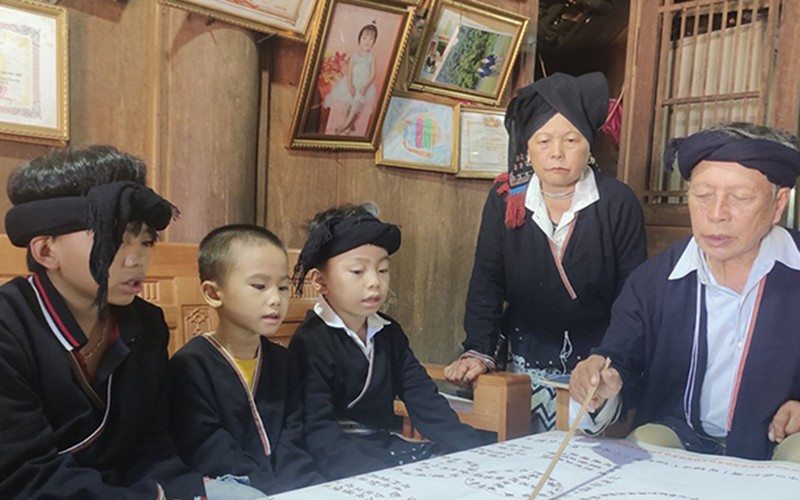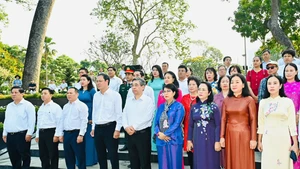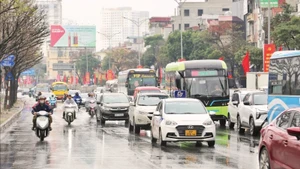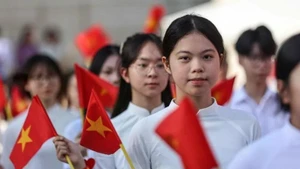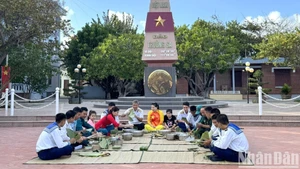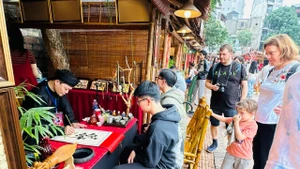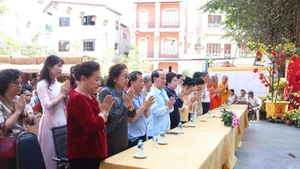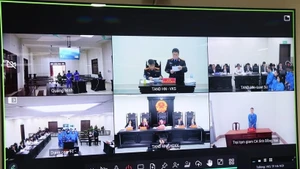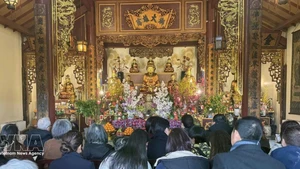The CERD was adopted and opened for the countries to sign and ratify under the United Nation (UN) General Assembly’s Resolution No. 2106 A, dated December 21, 1965. The convention aims to condemn and towards eliminating racial discrimination, while establishing the obligation for member countries to apply all necessary measures and not delay policies aimed at eliminating racial discrimination based on race, skin colour, lineage, ethnicity, or minority origin.
In its preamble, the CERD affirms “all human beings are equal before the law and are entitled to equal protection of the law against any discrimination and against any incitement to discrimination” and also notes that “States Parties undertake to prohibit and to eliminate racial discrimination in all its forms and to guarantee the right of everyone, without distinction as to race, colour, or national or ethnic origin” (Article 5).
The contents of the CERD have many similarities with Vietnam’s guidelines, policies, and laws. Right from the birth of the Democratic Republic of Vietnam (now the Socialist Republic of Vietnam), the 1946 Constitution, which was approved by the National Assembly, was built on the principles of: solidarity of the entire people, regardless of race, gender, social class, and religion; ensuring democratic freedoms; and conducting a strong and wise government of the people.
On that basis, the 1946 Constitution affirmed all Vietnamese citizens are equal in rights in all aspects, political, economic and cultural (Article 6); all Vietnamese citizens are equal before law and entitled to participate in administration and national construction, depending on their respective talent and morality (Article 7); in addition to equality of rights, national minorities are helped in all aspects to quickly catch up to the common level (Article 8).
Over the historical periods, the system of legal documents in Vietnam has been increasingly perfected, in which the elimination of all forms of racial discrimination has received great attention and is guaranteed by the Party and State. Article 5 of the 2013 Constitution defines: “The Socialist Republic of Vietnam is a unified nation of all ethnicities living together in the country of Vietnam. All the ethnicities are equal and unite with, respect, and assist one another for mutual development; all acts of discrimination against and division of the ethnicities are prohibited. The national language is Vietnamese. Every ethnic group has the right to use its own spoken and written language to preserve its own identity and to promote its fine customs, practices, traditions, and culture. The State shall implement a policy of comprehensive development and create the conditions for the minority ethnicities to fully utilize their internal strengths and develop together with the country.”
Furthermore, regulations on equality and racial non-discrimination have continued to be specified in legal documents, policies, national goals, etc. while being deployed synchronously in all fields to create favourable conditions for ethnic minority groups to develop equally in the great family of Vietnamese ethnic groups.
With the similarities in viewpoints and goals of protecting human rights in general and eliminating all forms of racial discrimination in particular, Vietnam joined the CERD in 1982. Since then, Vietnam has always seriously implemented the contents of the CERD as well as actively implemented many guidelines and policies to ensure and promote the rights of ethnic minorities.
In 1983, 1993, 2000 and 2012, Vietnam successfully defended the National Report on the implementation of the CERD. This proved the efforts made by the Party and State in the implementation of the agreement, especially in ensuring the rights of ethnic minorities such as hunger eradication, poverty reduction, social security assurance, and gender equality.
Vietnam continues to develop the CERD 5 National Report to send to the Convention Committee and it is scheduled to defend at the Committee's 111th session, which is expected to take place in November and December 2023. Noting the CERD 5 National Report, Deputy Director of the International Cooperation Department under the Central Committee on Ethnic Minority Affairs Tran Chi Mai said the report was comprehensively built on the basis of comments from State agencies at the central and local levels, Party and National Assembly agencies, socio-political organisations, and non-governmental organisations and people.
Specifically, the CERD 5 National Report shows the results of Vietnam's implementation of the CERD from 2013 to 2019, focusing on the following contents: Vietnam's legal system and institutions to ensure and promote the rights of ethnic minorities in Vietnam; defining racial discrimination, and assessing the appropriateness of the definition of racial discrimination in Vietnamese laws; the important role of ethnic work and the implementation of ethnic policies in eliminating all forms of racial discrimination; the results of the implementation of commitments to prohibit and eliminate racial discrimination in all forms and ensure equality before the law for ethnic minorities in Vietnam; and measures to ensure that ethnic minorities in Vietnam do not suffer any acts of racial discrimination.
With the above contents, it can be affirmed that the CERD 5 National Report will provide the international community with a fairly comprehensive picture of anti-racism in Vietnam, from legislative, administrative, and judicial measures as well as other measures that Vietnam has developed and implemented to the results of the implementation of those measures during the 2013-2019 period to protect human rights and combat acts of discrimination and racism, with a focus on ethnic minorities in Vietnam.
The CERD 5 Report presented and defended at the Convention Committee will be an opportunity for Vietnam to propagate achievements in human right protection, especially the Party’s guidelines and State’s policies towards ethnic minorities. In a country where 53 of the 54 ethnic groups are minorities, ensuring the rights of ethnic minorities is extremely important in the cause of national construction and defence.
In addition, through the CERD 5 National Report, the image of Vietnam with people who are always harmonious, united, cohesive, and the sense of compliance with the law will be spread to the international community, towards enhancing the understanding and cooperation. This this vivid and convincing reality will contribute to refuting the slanderous and distorted allegations of hostile forces and lack of goodwill towards Vietnam, especially in the implementation of policies for ethnic minorities.
However, sadly, in recent times, untrue views and opinions about so-called "ethnic discrimination" and “discrimination against ethnic minorities” in Vietnam have appeared on some social networking forums and within some segments of the population.
More dangerously, sabotage and hostile subjects have taken advantage of the difficulties in the lives of ethnic minority people, disputes, complaints, and problems left by history to deepen disagreements and conflicts and incite extreme nationalist ideology. The areas targeted by the vandals are the Northwest, Central Highlands, and Southwest regions, which gather a large number of ethnic minorities. As in the Northwest region, the rebels established the so-called "Mong Kingdom” and made demands for "autonomy".
Meanwhile, in the Central Highlands, anti-sabotage subjects claimed that "the Central Highlands belongs to upland people” and the Kinh people stole land from the ethnic minority people in their own homeland", and then incited the ethnic people in the Central Highlands to “unite to the Kinh people”. Similarly in the Southwest, the subjects incited ethnic Khmer people to secede and establish an "independent Khmer Krom State".
In addition, the hostile forces also enticed, seduced, and organised activities such as illegal border crossings and free migration, aiming to destabilise the lives of the people. They have claimed that Vietnam is always racist and violates human rights and called for the intervention of international organisations. It is not difficult to identify the plot of these sabotaging and hostile subjects to divide the great national unity bloc, cause people to distrust the Party and State, incite riots, and overthrow the regime.
This reality shows that hostile forces have never given up their plots and subversive tactics hidden under the guise of ethnic discrimination and racism, which are extremely sophisticated, sinister, and unpredictable. In particular, the incitement and sabotage in cyberspace have been thoroughly exploited by them to spread "centipedes" to regions to infiltrate ethnic minority communities, which is extremely dangerous.
This reality requires Party committees at all levels, local administrations as well as mass organisations to continue to well implement policies related to ethnic work, constantly improve the material and spiritual lives of the people, especially those in remote and mountainous areas. In addition, the authorities need to detect, promptly prevent, and strictly handle in accordance with the law those who commit acts of sabotage and incite racism.
People, especially ethnic minorities, need to raise their spirit of vigilance, absolutely trust in the leadership of the Party and State, and not believe and follow the manipulation and enticement of others to carry out acts that violate the law. Each citizen needs to uphold responsibility and promptly detect negative manifestations in the community to report to the authorities for clarification.
The synchronous coordination of both the political system and people will create a tight and effective solidarity, thus helping to effectively prevent and defeat all plots and sabotage-tricks of bad actors.
